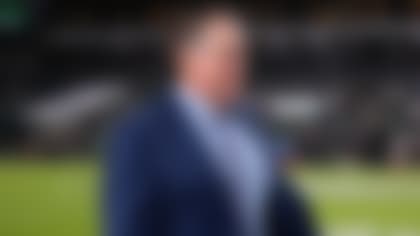It's perfectly appropriate that the Los Angeles Rams are playing the leading role in the 2016 NFL Draft. They are, after all, Hollywood's team now -- and Hollywood likes nothing more than a star that delivers bombshells and suspense.
The bombshell came nearly two weeks ago: L.A.'s blockbuster trade with the Tennessee Titans to get the first overall pick in this week's draft. Since then, the Rams have batted their eyes like an ingénue on the clock, trying to convince everyone they aren't sure which of the top quarterbacks -- Cal's Jared Goff or North Dakota State's Carson Wentz -- they will select Thursday night. Nobody really believed them, and the Eagles blew the Rams' cover when they traded up to get the second overall pick from the Browns because they want to make sure they get their quarterback of the future, too.
Neither team would make such a daring move without being very sure who it would pick, but the premature death of suspense this year is beside the point. The derring-do of the Rams and Eagles has given the draft its frisson of tension and its whiff of danger. And that replaces what had seemed to be a draft year in which, throughout the college season and the start of the evaluation process, there was so little conviction about any quarterback that it was unclear whether one -- let alone two -- would be taken anywhere near the top of the first round at all.
Instead, we now have a first round largely hinging on whether Jeff Fisher is making the right choice in not again casting his fortunes with a big-bodied, small-school quarterback like Wentz in favor of the presumed top pick, Goff. And whether the Eagles' bet on Wentz at No. 2, with two quarterbacks already in place this season, is Donovan McNabb redux or a foolish waste of resources. These are critical decisions, not least because they will coronate the faces of franchises -- and, in the Rams' case, provide the star power to a team that needs to lure fans. But they also directly affect many others -- the Cleveland Browns, who picked up a boatload of picks from the Eagles after realizing the Rams were likely to take the quarterback they coveted, most obviously -- who might still want a quarterback out of this draft, too, and now could be forced to maneuver around the board to get one.
The scramble that already has rearranged the draft has other possible ramifications. It could send left tackle Laremy Tunsil -- the presumptive first overall pick until the Titans traded out of the spot -- sliding down the draft board if the San Diego Chargers don't take him with the third pick, forcing other members of a class deep in offensive and defensive linemen down the order as bargains for waiting teams. And it might boost the prospects for Memphis quarterback Paxton Lynch, expected to be the third quarterback selected. Lynch is thought to need time to develop as a pro passer, but he now might be intriguing to the teams that will not be able to get to Goff and Wentz, thus potentially elevating the 6-foot-7 signal caller into an earlier-than-expected first-round slot.
"Two things you can't do -- miss on a first-round quarterback and pass on a first-round quarterback and he winds up being good," said Brian Billick, who freely admits that missing on a first-round quarterback while he was in Baltimore, Kyle Boller, contributed to his demise there. "Jeff Fisher is the perfect example -- he's been on both sides. Took Steve McNair, hit the jackpot. Took Vince Young -- out of work."
The NFL is littered with examples of how fraught the decisions are. Eight of the 12 quarterbacks who own multiple Super Bowl rings were drafted in the first round. And that includes six QBs who went No. 1 overall. But recently, the second quarterback to come off the board in a draft has struggled. Before Marcus Mariota was selected No. 2 overall last year, the previous five guys who assumed the title of second quarterback taken were Johnny Manziel, Geno Smith, Robert Griffin III, Jake Locker and Tim Tebow. Only Smith and Griffin are currently in the league. And the coaches and executives who selected those five all lost their jobs.
"The thing you have to be careful of is the new coach comes in, I want to get my quarterback now and get this thing going now," said Charley Casserly, the former Houston and Washington general manager, who drafted David Carr first overall in 2002. "You have to be leery of forcing the quarterback, which is where Cleveland is."
The history is especially daunting in the few years when quarterbacks have gone first and second, suggesting that it is likely that either the Rams or Eagles will be disappointed, if not devastated, by the aftermath of this draft. Including last year, when Jameis Winston went first, followed by Mariota, there have been just six years since the common draft began in 1967 in which quarterbacks went in the top two picks. In only one of those years (excluding Winston and Mariota, since it's too early to deduce anything conclusive there) could both of the quarterbacks be considered to have had successful careers: Jim Plunkett and Archie Manning from the 1971 draft, and Plunkett's success in Oakland came only after seven mediocre seasons in New England and San Francisco. The other pairings have seen success, so far at least, by just one of the quarterbacks: Andrew Luck and Robert Griffin III (2012), Tim Couch and Donovan McNabb (1999), Peyton Manning and Ryan Leaf (1998), Drew Bledsoe and Rick Mirer (1993).
Even more pointed is the limits of their success. Plunkett and Peyton Manning won two Super Bowls each. McNabb started a Super Bowl for the Eagles. Bledsoe started the 2001 season for the Patriots, but his injury launched Tom Brady's career and the Patriots won the Super Bowl that year with Brady starting.
Still, in a quarterback-obsessed league, the past is usually ignored as the quest to get the right signal caller continues, pushing QBs further and further up the board. For every Ben Roethlisberger, Aaron Rodgers and Joe Flacco pointed to as examples of quarterbacks found later in the first round, there is the 2011 draft. Cam Newton went first overall. After him, Locker, Blaine Gabbert and Christian Ponder went in the top 12. Gabbert, who is 8-27 as a starter, remains in the league and could be the 49ers' starter in 2016. Ponder started just 36 games before getting cut loose and spending last year looking for work. Locker logged just 23 starts before retiring last offseason.
"It's the football decision that's most visible to fans and journalists -- and it's the easiest to judge and it's got the greatest propensity for getting executives and coaches fired of any position," said agent Leigh Steinberg, who this year is representing quarterback Paxton Lynch but who also represented Troy Aikman, Ryan Leaf and Ben Roethlisberger earlier in his career. "The rule goes that if a team is high in the draft or can get to a high position, that's the time to fill the quarterback need. The hope for that franchise is they'll never be that high again. Tom Brady was an outlier -- you're watching Carson Palmer, Cam Newton and Peyton Manning on the last four teams last season. It's so critical. You can fill those other needs later. If you do this pick right, it's the gift that keeps on giving for a decade."
Follow Judy Battista on Twitter @judybattista.












